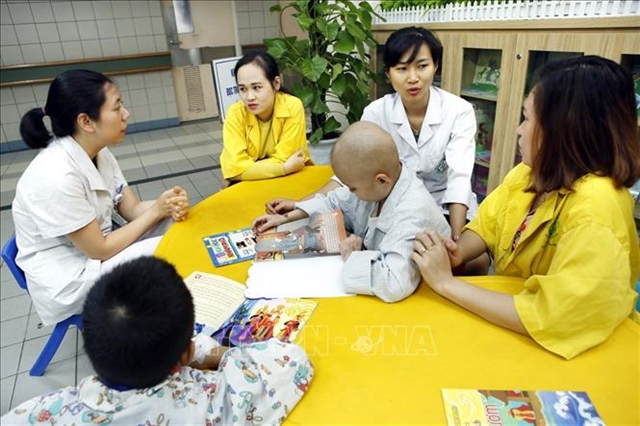Vietnam News – A seminar, hosted by the Department of Medical Examination and Treatment Administration under the Ministry of Health, discussed the urgent need to standardize social work within hospitals, ensuring higher professionalism and effectiveness.
HCM CITY – The significance of social work in hospitals continues to grow, playing an increasingly vital role in medical facility operations, experts agreed yesterday at a seminar on social work in hospitals.
The seminar, hosted by the Department of Medical Examination and Treatment Administration under the Ministry of Health, discussed the urgent need to standardize social work within hospitals, ensuring higher professionalism and effectiveness. It also invited feedback on amendments to a circular on the tasks and operation of social work at hospitals in the southern region.
Associate Professor Nguyễn Tuấn Hưng, Deputy Director of the Department of Personnel and Organization at the Ministry of Health, highlighted that social work departments and groups had been established in all central hospitals in Việt Nam, with provincial and district hospitals following suit at rates of 96.8 per cent and 89.9 per cent, respectively.
Over the past decade, social work activities in medical facilities made strides towards professionalization across legal documentation, human resources, training, scientific research and practical applications.
According to Hưng, the organizational models for social work departments vary widely across the country, with the majority situated under departments and faculties, particularly the Nursing Department (36.8 per cent). Only 18 per cent of units currently have a dedicated social work unit, while 7 per cent have independent social work teams.
Despite the progress, challenges persist. Legal documents governing social work in medical facilities exhibit limitations such as overly broad and general tasks, task overlap, and exceeding the capacities of social workers. Moreover, some leaders within the Department of Health and medical facilities show insufficient interest in social work, particularly in preventive medicine and population health.
Addressing the impediments to genuine development, Lương Ngọc Khuê, Director of the Department of Medical Examination and Treatment Management, noted the prevalence of part-time human resources (constituting over 60 per cent) within the social work field. The proportion of officers and employees with specialized training in social work remains low. Additionally, there is currently no standardized training program for social workers in hospitals or medical examination and treatment facilities, and competency standards are lacking.
Trần Văn Hùng, Head of the Social Work Department at Hồ Chí Minh City Medicine and Pharmacy University’s hospital, suggested the establishment of competency standards for hospital social workers, the issuance of practice certificates akin to other medical staff, and the inclusion of additional duties, such as assessing and providing psychosocial interventions, in patients’ medical records.
Conference delegates recommended the establishment of social work departments in hospitals or, alternatively, the formation of Social Work Groups. These groups, not necessarily affiliated with specific departments, would allow hospitals to tailor their structures based on unique tasks, operational scales and organizational arrangements.
Furthermore, there was a call to support medical staff in their social work activities, providing psychological support and coordinating resources for financial and material assistance. Simultaneously, fostering improved relationships between medical staff, patients, and their families was emphasized.
In conclusion, participants agreed that the standardization of social work activities in hospitals was crucial for ensuring professionalism, efficacy, and the overall well-being of both healthcare professionals and the patients they serve. VNS

